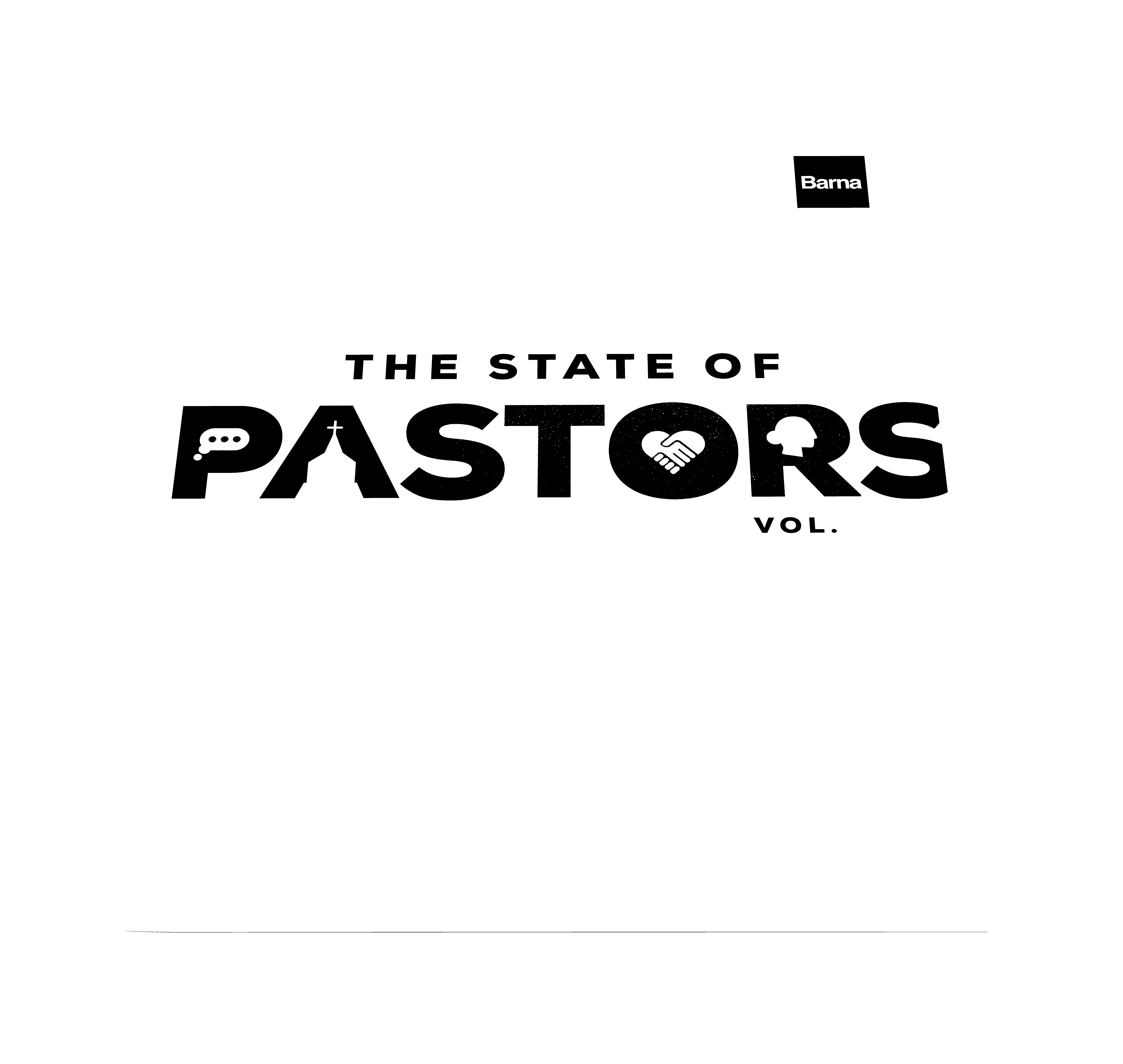
From the modesty debate to the mainstreaming of “twerking,” the American public has a complex relationship with sex. Ever since the sexual revolution of the 1960s, the liberalization of social and moral attitudes toward sex has met with a conservative backlash troubled by the impact of an increasingly sexualized culture.
So what do Americans think about sex? What is its purpose, and where should we have it? And what do people think about traditional sexual ethics? Are they outdated? In a recent study, Barna Group asked about these and other questions related to sex—and discovered there is no broadly shared consensus among American adults.
Half of U.S. adults (50%) agree strongly that “choosing not to have sex outside of marriage is healthy.” But generational differences are significant. Six in 10 Elders (59%) agree strongly with this statement, compared to 53 percent of Boomers, 49 percent of Gen-Xers and 43 percent of Millennials.
Practicing Christians (72%) are almost twice as likely as adults of no faith (38%) to say that choosing not to have sex outside marriage is a healthy choice. Women (56%) are more likely than men (43%) to hold this view. Compared to those who have never been married (41%), people who are married (53%) and, somewhat surprisingly, cohabitating adults (49%) are more likely to strongly agree with the statement.
It may be that these differences of opinion spring at least in part from confusion or ambivalence about the purpose of sex. When U.S. adults are asked to choose one or more phrases from a list of options that summarizes what sex is for, not everyone agrees.
Among all American adults, the most common answers given when asked about the purpose of sex were “to express intimacy between two people who love each other (63%), “to reproduce / to have children” (60%), and to connect with another person in an enjoyable way (45%).
Your Leadership Toolkit
Strengthen your message, train your team and grow your church with cultural insights and practical resources, all in one place.
There are disparities, for instance, between generational cohorts. Overall, Elders and Boomers tend to share a stronger consensus about the purpose of sex. That is, clear majorities among the older generations say sex is for procreation (79% Elders; 71% Boomers), expressing intimacy between two people who love each other (68% Elders; 73% Boomers) or uniting a man and woman in marriage (62% Elders; 50% Boomers).
The two younger adult generations are much less likely to embrace these traditional views of sex. Most Gen-Xers and Millennials continue to believe conventional ideas of sex: that it is to express intimacy between two people who love each other (57% Gen-Xers; 56% Millennials) or to procreate (52% Gen-Xers; 51% Millennials). However, the notion that it should unite a man and woman in marriage is endorsed by just one-third of Xers and Millennials.
Nearly half of younger generations say that sex is to connect with another person in an enjoyable way (44% Gen-Xers; 49% Millennials), though this sentiment is not much different from older adults. Notably, Millennials are much more likely than older adults to say the purpose of sex is self-expression and personal fulfillment (41%).
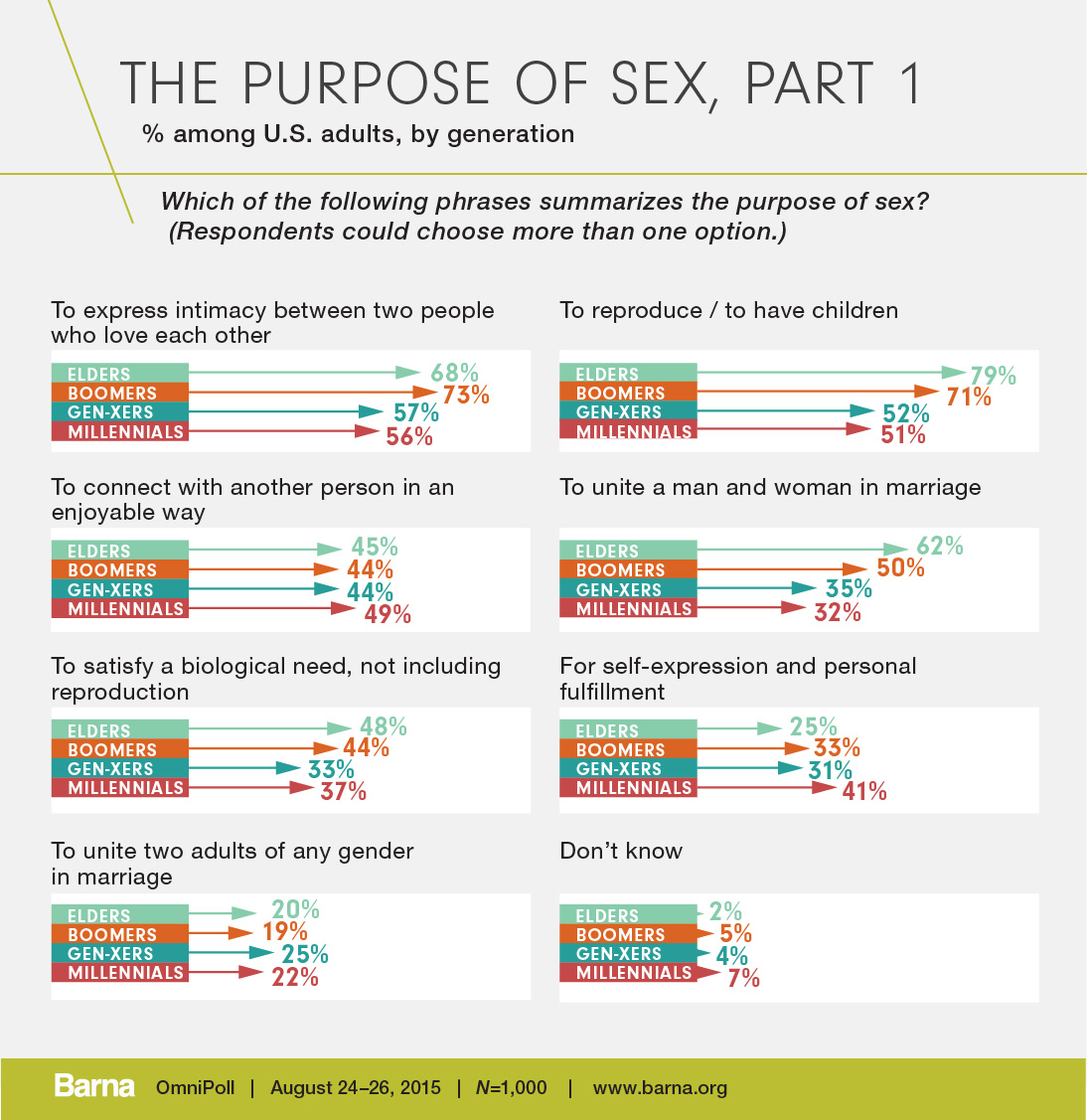
Gender seems to play a role in one’s view of sex. Seven out of 10 women (69%) say the purpose of sex is to express intimacy, but a smaller majority of men, 57 percent, believe the same. Conversely, men are more likely than women to indicate sex unites a man and woman in marriage (45% men; 39% women) or satisfies a biological need other than procreation (43% men; 36% women).
Practicing Christians (56%) are more than twice as likely as those with no faith (25%) to say the purpose of sex is to unite a man and woman in marriage. At the same time, those with no faith are much more prone than practicing Christians to say sex is for connecting with another person in an enjoyable way (60% no faith; 36% practicing Christians) or for self-expression or personal fulfillment (46% no faith; 26% practicing Christians). There are also notable differences between these groups and Americans who identify with a religious faith other than Christianity. For instance, those of other faiths consider marriage as at a higher rate (32%) than the other groups (23% no faith; 15% practicing Christians), or to satisfy a biological need, (46%), comparatively (33% no faith; 32% Practicing Christians).
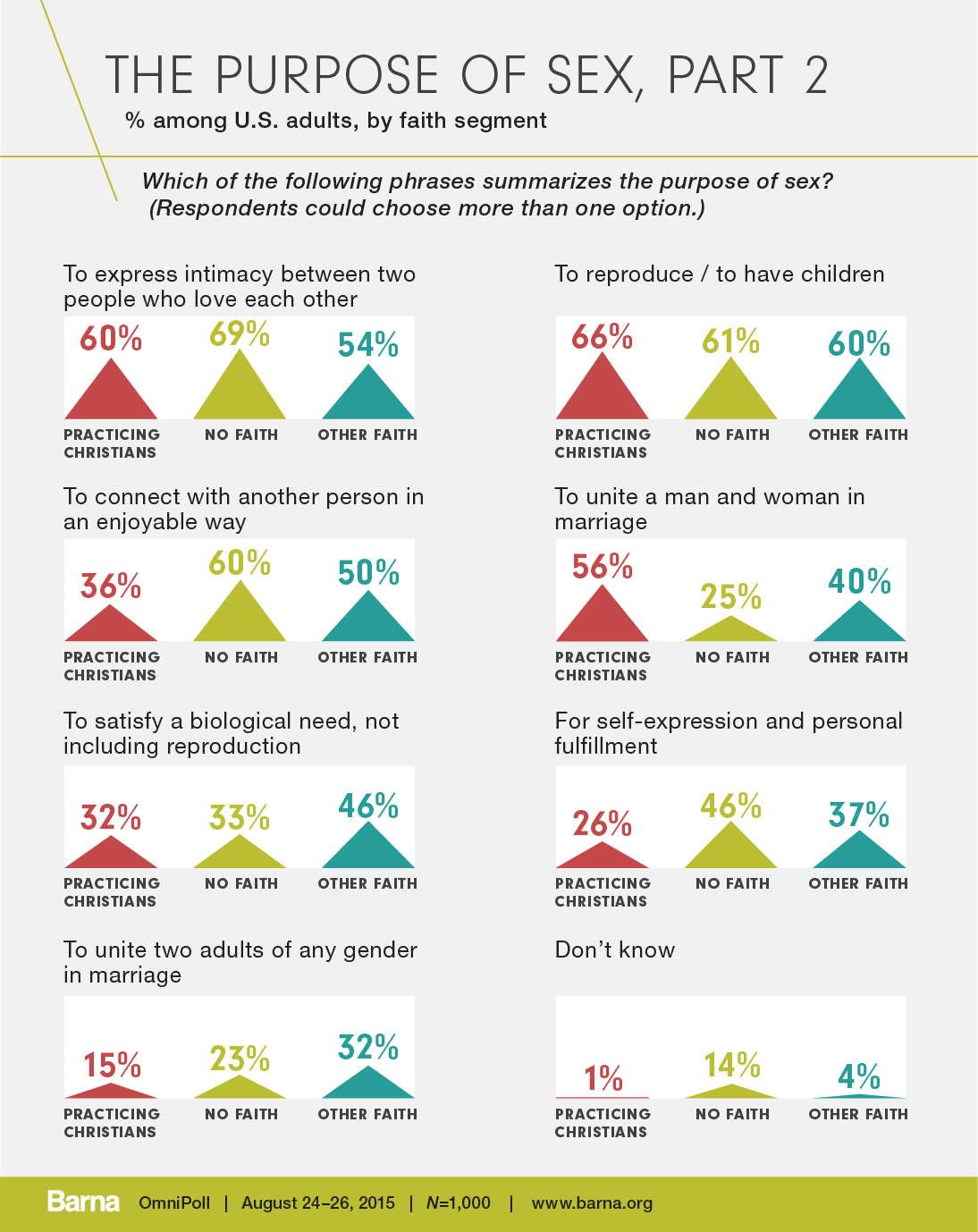
Traditional Sexual Ethics: Moral, Good and Unrealistic
Barna asked American adults their opinion of traditional Christian sexual ethics, which teaches “that sex should only be within a marriage between a man and a woman.” Among all adults, the top five descriptions of this phrase are “moral” (36%), “good” (28%), “healthy” (27%), “right” (27%) and “unrealistic” (22%). The rest were “anti-gay” (16%), “too strict” (13%), “repressive” (13%), “virtuous” (12%), “unenlightened” (9%), “wrong” (7%), and “damaging” (6%).
Generationally, there is again greater consensus among older adults than among younger Americans on this matter. The top five descriptions among Gen-Xers and Millennials are similar to their older counterparts, but smaller proportions share the traditional point of view on traditional Christian sexual ethics. For example, “moral” is the number-one choice of both Millennials and Elders, but the younger cohort (26%) is half as likely as their elders (51%) to choose this option. Also, Millennials were the only generational segment that had “anti-gay” (19%) in their top five, as well as the only one missing “right” (16%) from their top five.
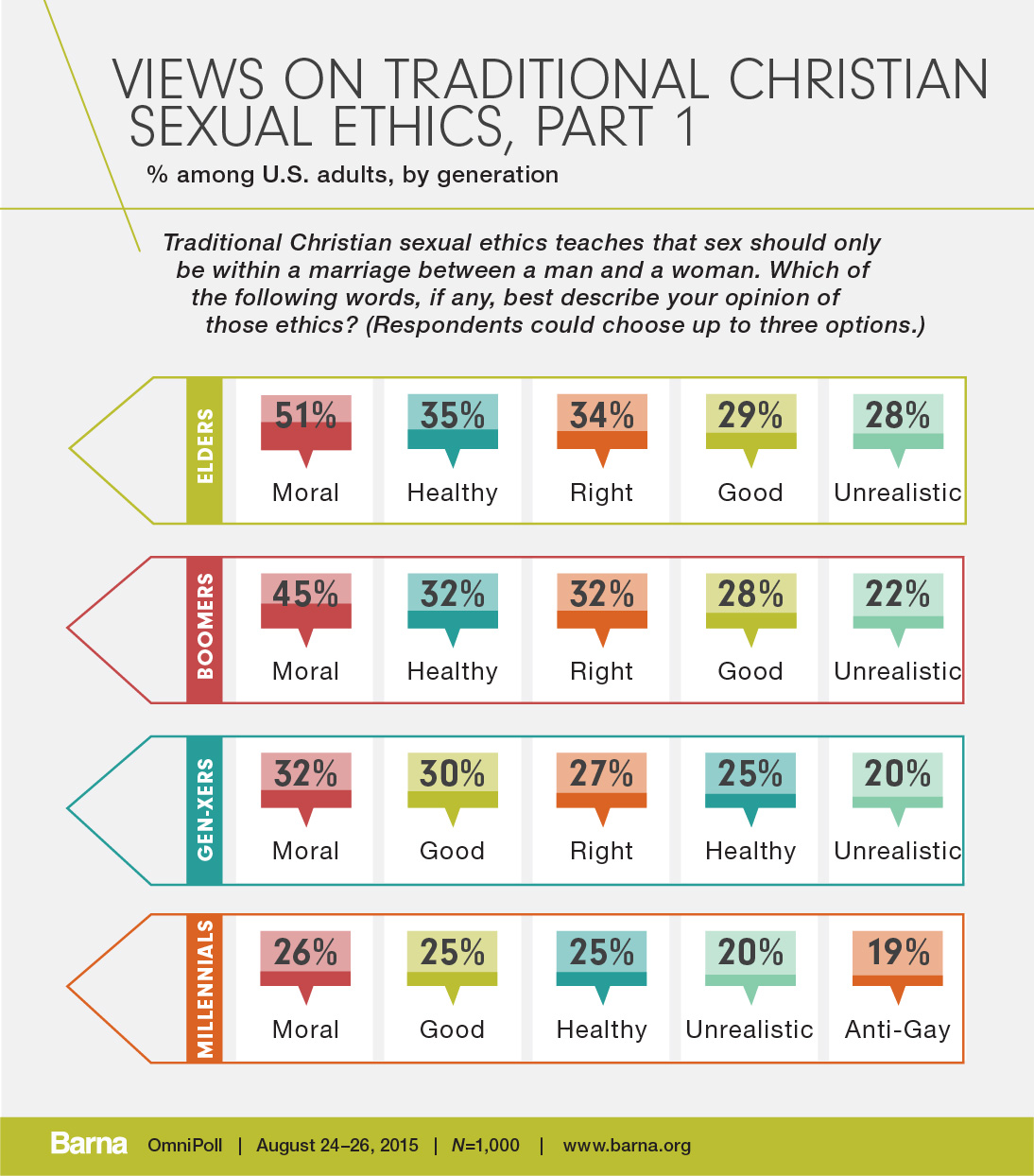
Your Leadership Toolkit
Strengthen your message, train your team and grow your church with cultural insights and practical resources, all in one place.
Unsurprisingly, Christians hold more positive opinions than non-Christians when it comes to traditional Christian sexual ethics. On the other hand, adults who say they are not believers (that is, they are atheists, agnostics or unaffiliated) view the statements on Christian sexual ethics in a distinctively negative light: Just 11 percent believe traditional ethics are “moral,” and that definition ranks ninth among their preferences—the highest of all positive descriptors. Otherwise, non-believers say that such sexual ethics are unrealistic (36%), anti-gay (27%), repressive (25%), too strict (17%), or that they aren’t sure what to make of it (17%).
What’s interesting is that people who hold to faiths other than Christianity, such as Jews, Muslims, Buddhists, and so on, are likely to embrace a mix of favorable and unfavorable views of traditional sexual ethics. Their top five descriptors includes moral (28%), right (26%), anti-gay (24%), unrealistic (22%), and good (21%).
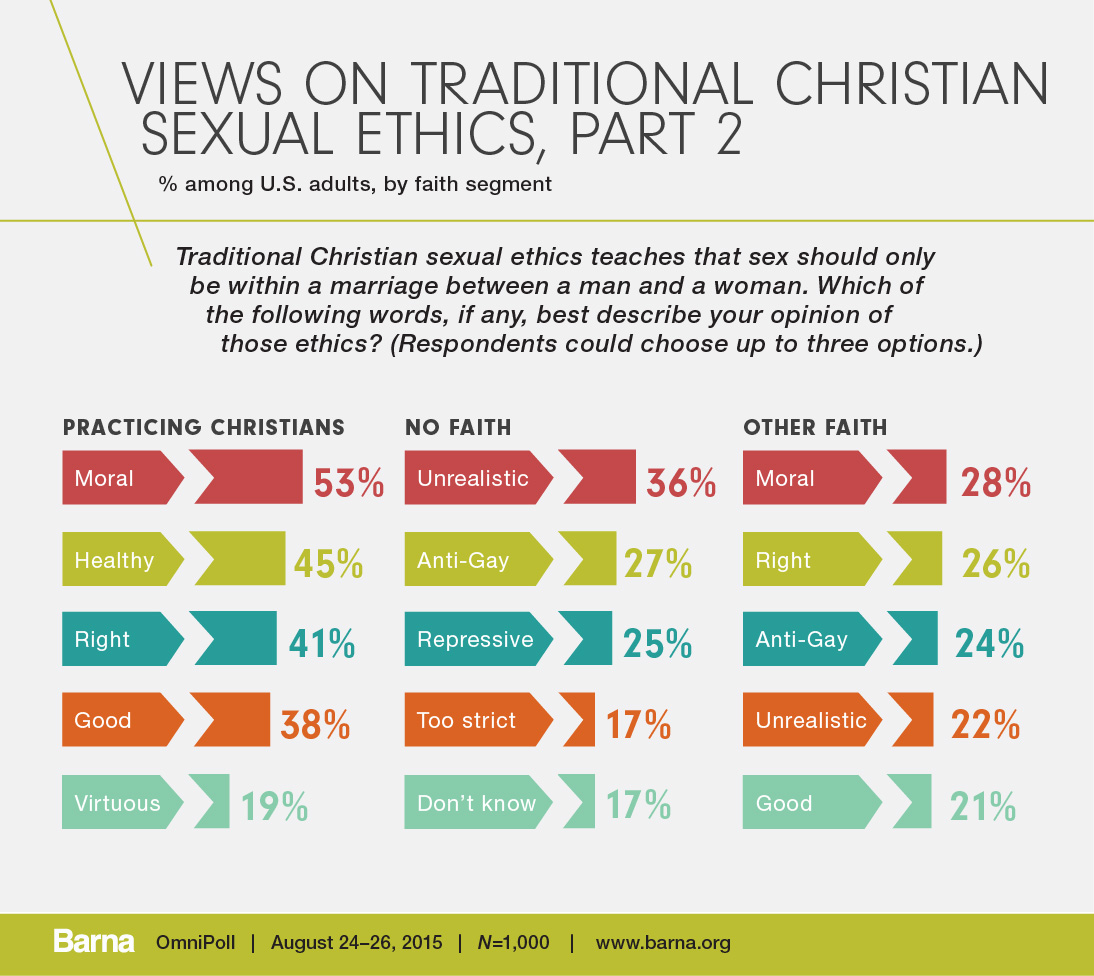
What the Research Means
Roxanne Stone is editor in chief at Barna Group and says that the research shows the collision of new and old attitudes about sex in society today. “The big story here is how little everyone agrees on when it comes to the purpose of sex,” says Stone. “There’s never been a shortage of conversations and cultural imagination around sex, but this current lack of consensus points to a growing ambiguity and tension over its place in society and in the individual’s life.
“Of course, the greatest divides are where you’d expect them,” notes Stone. “Between people of faith—especially Christians—and the broader population. And between younger and older generations. Whereas practicing Christians still overwhelmingly tie sex to marriage, the move among the greater U.S. population—most evidently among younger generations—is a de-linking of marriage and sex. Sex has become less a function of procreation or an expression of intimacy and more of a personal experience. To have sex is increasingly seen as a pleasurable and important element in the journey toward self-fulfillment.
“It is impossible to separate this shift from other cultural trends, most notably the delay of marriage,” continues Stone. “The age of first marriage has climbed into the late twenties for both men and women. This, dovetailing with a popular and increasingly assumed narrative of sex as a normal part of the single life, makes the case for saving sex until marriage a radical one.
“It’s important for Christian leaders to notice this shift in the framing of sex and to adjust their own conversations accordingly,” says Stone. “If sex is being viewed as an individualistic act of self-expression and personal fulfillment—then how can leaders both acknowledge the ways sex does help us grow as individuals, but also offer a counter-narrative that emphasizes the sacrificial nature of love and intimacy? If a significant (albeit decreasing) number of young adults still view sex as an avenue toward intimacy—then how can leaders celebrate that desire, while offering reasons to reserve that level of intimacy for marriage? The views toward the meaning of sex revealed in the research can help Christian leaders frame their conversations about sex toward the real perspectives and pain points Americans—especially young adults—are feeling toward the topic.”
Your Leadership Toolkit
Strengthen your message, train your team and grow your church with cultural insights and practical resources, all in one place.
Comment on this research and follow our work:
Twitter: @davidkinnaman | @barnagroup
Facebook: Barna Group
About the Research
The study on which these findings are based was conducted via online surveys from August 24 to August 26, 2015. A total of 1,000 interviews were conducted. The sample error is plus or minus 3.0 percentage points at the 95-percent confidence level. The completion rate was 71 percent.
Minimal statistical weighting was used to calibrate the sample to known population percentages in relation to demographic variables. The online study is derived from a probability panel, which means that respondents are recruited for inclusion in the research based on physical mailing addresses, not an opt-in online panel. Those randomly selected households without Internet access are provided an Internet-enabled device to complete surveys.
Generations: Millennials are the generation born between 1984 through 2002; Gen-Xers, between 1965 and 1983; Boomers, between 1946 and 1964; and Elders, in 1945 or earlier.
“Other faith” indicates respondents who self-identify with a religion other than Christianity.
“No faith” indicates respondents who self-identify as atheist or agnostic, or who are religiously unaffiliated.
“Practicing Christians” are self-identified Christians who have attended a church service in the past month and say their religious faith is very important in their life.
About Barna
Since 1984, Barna Group has conducted more than two million interviews over the course of thousands of studies and has become a go-to source for insights about faith, culture, leadership, vocation and generations. Barna is a private, non-partisan, for-profit organization.
Related Posts

Is It Possible to Balance Work, Family & Love?
- Faith
- Family
-
From the Archives

New Marriage and Divorce Statistics Released
- Family
-
From the Archives

Porn in the Digital Age: New Research Reveals 10 Trends
- Culture
- Technology
-
From the Archives
Lead with Insight
Strengthen your message, train your team and grow your church with cultural insights and practical resources, all in one place.
Get Barna in Your Inbox
Subscribe to Barna’s free newsletters for the latest data and insights to navigate today’s most complex issues.

